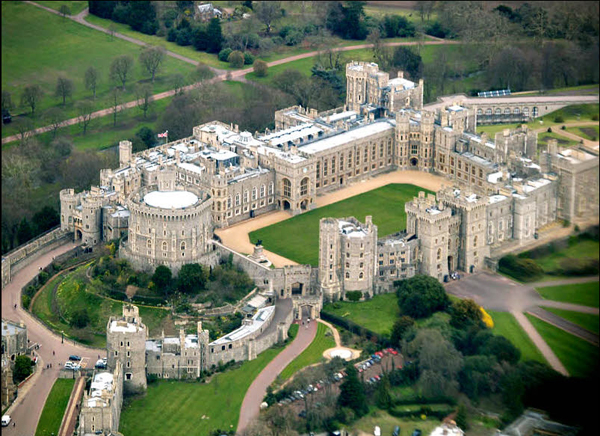
An aerial view of Windsor Castle
|
Looking at this photo one’s first impression is that of a setting for a fairy tale. The immensity of the edifice, the marvelous variety of parts, the delicacy and strength that are affirmed in everything – all suggest that one is in the presence of something that far surpasses our day-to-day reality. This fantastic set of buildings is both the symbol and the shrine of an institution: the British Royalty.
In this symbol – like so many others of traditional England – the appearances still do not bear the mark of Protestantism, Liberalism or Socialism. What is expressed in these granite forms is still the medieval and Catholic concept of the divine origin of public power, the true majesty that should surround any political regime, and the paternal mark that should characterize it.
Paternal mark, we say. This castle does not aim to show massiveness, but talent. It is not made to intimidate, but to delight. The subject who contemplates it does not shiver at its sight; he does not feel like fleeing, but rather like entering.
And this for one simple reason: The King is a father who affably calls his subjects to himself, not an executioner who inspires fear to them.
*
The relations between the great and the small are influenced by this ambience. The nobility of the Lord is transmitted to his servant.
Thus the immense kitchen of Windsor, at left, which is very authentically a kitchen, is indisputably a high, noble and worthy kitchen of a castle. It communicates something of the royal dignity itself to the humble menial activity of the cook and gives it a splendor that is, as it were, regal.
This is because in Christian Civilization the grandeur of the Lord does not humiliate the servant, but elevates him.

Translated from Catolicismo, August 1959
Posted November 14, 2012

  | | Prof. Plinio |
Organic Society was a theme dear to the late Prof. Plinio Corrêa de Oliveira. He addressed this topic on countless occasions during his life - at times in lectures for the formation of his disciples, at times in meetings with friends who gathered to study the social aspects and history of Christendom, at times just in passing.
Atila S. Guimarães selected excerpts of these lectures and conversations from the transcripts of tapes and his own personal notes. He translated and adapted them into articles for the TIA website. In these texts fidelity to the original ideas and words is kept as much as possible.

Related Topics of Interest
 Mittenwald and Its Violins Mittenwald and Its Violins
 Fostering the Originality of Each Social Cell Fostering the Originality of Each Social Cell
 The Organic Formation of a Region The Organic Formation of a Region
 The City and Its Nobility The City and Its Nobility
 An Élan for Perfection Should Exist in All
Classes An Élan for Perfection Should Exist in All
Classes
 How Man Should Act over His Natural Environment How Man Should Act over His Natural Environment
 Proportion between the City and the Man Proportion between the City and the Man
 The Harmonic Life of the People The Harmonic Life of the People
 What is Organic Society? What is Organic Society?

Related Works of Interest
|
|